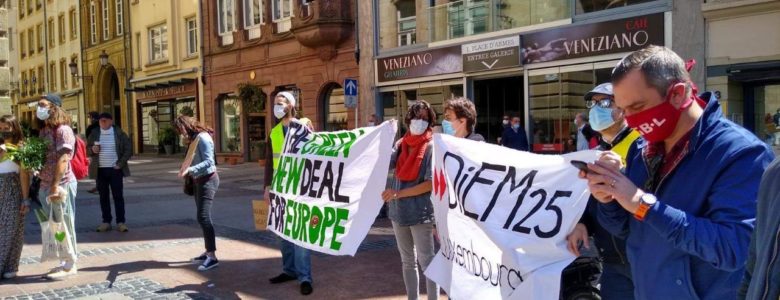
The EU is a hypocrite’s playground
One of the core problems of the European Union that DiEM25 set forth to address through its own structure was the lack of a common, comprehensive European political vision.
There is no single political programme towards which Europeans struggle, no common agenda: not even within the same ‘party’.
In the past week, there are two examples that perfectly showcase this.
In Luxembourg, our members participated in a demonstration against CETA (organised by Déi Lénk – the Left party), which was ratified on Wednesday in the Luxembourgish parliament. The occasion was no accident: in the previous years there have been substantial demonstrations against CETA in the streets of the city, but in the midst of the COVID-19 pandemic, the opposition was minimal — so minimal, in fact, that even Déi gréng (the Greens), who opposed CETA so loudly in the European Parliament, decided to vote in favour of ratifying CETA.
This should perhaps not come as a surprise from a Green party that, together with the LSAP (the Social Democrats), and the Democrat party (Liberals), voted against declaring climate emergency in Luxembourg last May. The hypocrisy is even starker when one recalls that last month, the Luxembourgish government (of which the Greens are a partner) signed a letter calling for a Green Deal for recovering from the corona-crisis, only to follow it with the exact opposite: the ratification of CETA, which brings more growth, international trade, and an intensified attack on workers’ rights and the environment.
Meanwhile in Greece, the hard-right government of New Democracy, led by Prime Minister Kyriakos Mitsotakis, who was lauded as a “Green Prime Minister” by some pundits at the beginning of his mandate, took the opportunity of quarantine-measures to pass through a massively unpopular anti-environmental bill, which they ironically dubbed the “Environmental Bill”.
Among the many destructive measures allowed through this bill is the absolutely shocking opening of protected “Natura” regions for oil exploration and construction sites. This is the same government that the European Commission has been lauding as a best-in-class – a kind of propaganda that goes all the way into full-out double-speak when Politico Europe gets involved: they described the measures as a “greening” of the country’s recovery.
To add insult to injury, SYRIZA MPs abstained from the vote: hardly surprising to those who have been following the country’s political scene since Tsipras’ capitulation in 2015. Many of the measures voted through by New Democracy, are the heritage of the endless austerity measures that SYRIZA condemned the country to five years ago.
It is sad to see those we would consider comrades from the Greens, who don’t hesitate to show up to climate strikes or lambast anti-environmental policies, behave with the same cynicism as hardcore conservative governments.
Worse yet is the hypocrisy and outright lies dominating Brussels when these topics are discussed: one thing is said in the European Parliament, Commission or Council, and a completely other transpires in the member states. We expect nothing better from New Democracy and other parties of that family, but it is truly unacceptable to have to face the same duplicity from so-called progressives.
That is why, in DiEM25, we are adamant: we need a single political programme for Europe, and people across the continent willing to fight for it. It is not just the Right that has brought us to this mess: it is our collective failure to rally to a single cause, and stick to it! DiEM25 was created to combat this failure: Europe will unite or die.
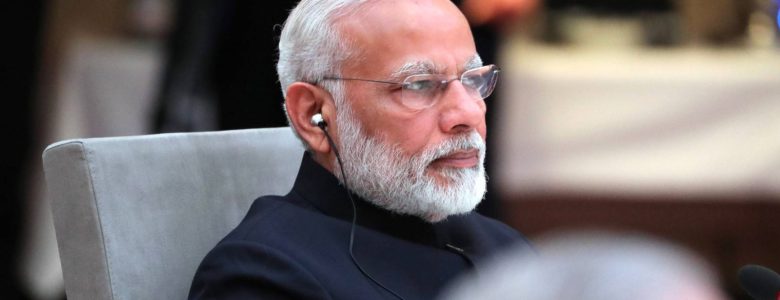
Europeans must stop rolling out the red carpet for Modi and Hindutva after this pandemic
Future of Euro-India Relations: Europeans must stop rolling out the red carpet for Modi & Hindutva after this Pandemic.
DiEM25 expresses concern for the role of Kashmir in a dispute between two nuclear powers. We call on all participants to pledge to a process of nuclear disarmament of the subcontinent and of the long running India-Pakistan conflict, in which Kashmir represents one of the more inflammatory points.
As a Pan-European and internationalist movement we demand that European Union members acknowledge their errors in having consistently rolled out the red carpet for Modi — while conveniently ignoring India sliding down the path of post-democracy, despite the blatant imitations by factions of the Bharatiya Janata Party (BJP) of the aesthetic and the behaviour of 1930s European expressions of phalangist Fascism.
Among the great achievements of India’s Independence, stands its secular Constitution which aimed to prevent sectarian division. This document enjoyed the support of Gandhi, himself a devout Hindu. We believe in upholding the universalist spirit of Rabindranath Tagore’s ideas of East-West dialogue, as well as the class consciousness of Bhimrao Ambedkar who first began to challenge the institutions and the mythology of caste in India.
Of course, these figureheads of independence have more recent heirs, our allies today, along with the striking workers and students who bravely protested the hijacking of constitutional law, (these ended shortly before the pandemic). After the twilight of quarantine ends, the protesters who shook India will return, and this time they will be less alone.
We call upon progressives in Europe and beyond to ask their representatives to take the BJP-ruled Indian Congress to task for bypassing the democratic system of Kashmir, and for having spurred deterioration of the world’s largest democracy for decades, undermined by the spread of racialist and sectarian propaganda.
Why has Europe for over 20 years turned a blind eye to Indian atrocities?
It has been reluctant to condemn the BJP government of exhibiting the kind of bigotry and intolerance that Europe sooner points out in its ‘official’ enemies.
The reason for this, we believe, is Modi’s embrace of the global financial institutions’ consensus, the massive implementation of austerity which relegated India to a subordinate position in the world economy and hegemony; which sought to undo India’s legacy as a member of the Non-Aligned Movement and to reverse and dismantle the legacy of the more progressive post-colonial governance of Prime Minister Sri Pandit Jawal Nehru.
Among the few dissident provinces within India that have held onto the Nehru legacy, we recognise the progressive model of Kerala which pledged to afford its inhabitants a Universal Basic Income during the recent virus-lockdown.
Europe must wake up to the dangers befalling the world’s largest democracy, as well as the nuclear tensions existing between India and Pakistan ever since Washington’s support for the Zia Ul-Haq regime that endorsed Pakistan with a nuclear weapon.
The spectre of Indian Partition remains an important breeding ground for disputes and sectarian rivalry, military tension and propaganda-warfare to this day. The real threat of Partition however, is not known to India alone, and we see many conflicts in the world and in Europe that emerge from the political tragedy of partition and colonialism.
DiEM25 is a movement with the historical memory of the dangers of crises of Partition, whether the kind that befell Ireland and former Yugoslavia, or when we speak the division of Ukraine today as a battleground between the West and Russia; or rivening tensions that threaten destabilisation within the Eurozone and beyond the EU’s borders today.
DiEM25 as a progressive movement calls for an end to the hatred, propaganda wars and nuclear arms races.
We demand that Europeans stop turning a blind eye to the atrocities of Modi’s post-democracy India. Our Carpe Diem Struggle for a more democratic EU, also means we strive for a less Eurocentric EU.
Previously DiEM25 insisted the EU act decisively on abusive members like Viktor Orbán. For similar reasons, the EU should alter its until now over-generous foreign and trade policy towards non-members who violate human and civil rights, regardless their business friendly “good behaviour” in the neoliberal order.
Written by Arturo Desimone.
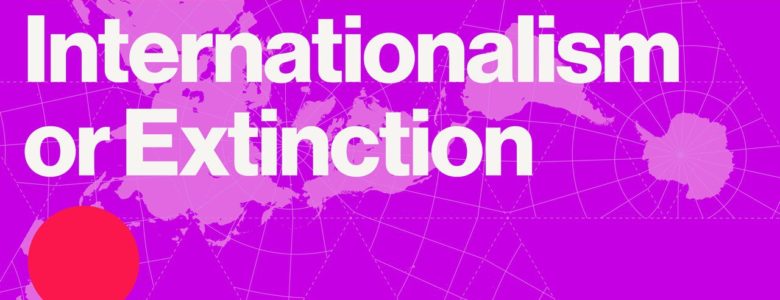
The Progressive International: an open call to all progressive forces
An Open Call to All Progressive Forces
There is a global struggle taking place of enormous consequence. Nothing less than the future of the planet is at stake. The end of history promised peace and global prosperity. Instead, it has destroyed communities, impoverished workers, and brought our environment to the brink of collapse. Feeding on the discontent, a network of right-wing factions is spreading across borders, working to erode human rights, silence dissent, and promote intolerance.
The time has come for progressives around the world to organize.
Let’s mobilize behind a shared vision of democracy, solidarity and abundance.
Let’s stand together to fight inequality, exploitation, discrimination and environmental degradation.
Let’s reclaim our communities, our cities, our countries, and our planet.
What is the Progressive International?
The Progressive International is a global initiative to unite, organise, and mobilise progressive forces around the world.
In December 2018, the Democracy in Europe Movement (DiEM25) and the Sanders Institute issued an open call to form a common front in the fight for democracy, sustainability, and justice.
“It is time for progressives of the world to unite.”
The Progressive International takes up that call. Launching in May 2020, the PI is a coordinating institution for the world’s progressive forces, with a mission to make solidarity more than a slogan.
Who is the Progressive International?
The Progressive International is a membership-based initiative. All individuals and organizations that share our vision of progress are invited to become members and build the Progressive International together.
The PI is guided by a Council of advisors that meets each year to set the strategic direction of the initiative. The current Council includes political representatives like Katrín Jakobsdóttir, Vicenta Jerónimo Jiménez, and Yanis Varoufakis; activists like Carola Rackete, Nick Estes, and Vanessa Nakate; and thinkers like Noam Chomsky, Arundhati Roy, and Naomi Klein.
The PI is supported by a Cabinet that is legally responsible for development, planning, and staffing decisions. The Cabinet is composed of three members of the Council, a member of the Summit coordination team, and a representative of the Secretariat.
The PI is coordinated by a Secretariat that includes translators, web developers, graphic designers, policy analysts, and community organizers. The Secretariat is responsible for the day-to-day operations of the PI.
What does it mean to be a ‘progressive’?
The PI defines ‘progressive’ as the aspiration to a world that is:
Democratic, where the people have the power to shape their institutions and societies.
Decolonised, where all nations determine their collective destiny free from oppression.
Just, that redresses inequality in our societies and the legacies of our history.
Egalitarian, that serves the interests of the many, and never the few.
Liberated, where all identities enjoy equal rights, recognition, and power.
Solidaristic, where the struggle of each is the struggle of all.
Sustainable, that respects planetary boundaries and protects frontline communities.
Ecological, that brings humans into harmony with their habitat.
Peaceful, where the violence of war is replaced by the diplomacy of peoples.
Post-capitalist, that rewards all forms of labor while abolishing the cult of work.
Prosperous, that invests in a brilliant future of shared abundance.
Plural, where difference is celebrated as strength.
Why is the Progressive International launching now?
Never before has international solidarity been more necessary — and more absent.
The Covid-19 crisis is deepening everywhere, hitting hardest among the world’s poor. Meanwhile, disaster capitalism is on the rise, as financial speculators and transnational corporations seek to profit from the pandemic. Standing behind them are the forces of the far right, who exploit the crisis to advance an agenda of bigotry and xenophobia.
Only a common international front can match the scale of these challenges and stand up for progressive principles around the world.
The last decade saw a wave of global unrest, as citizens rose up to demand a better life and a habitable planet. This is the decade that we unite these protest movements in a Progressive International, calling on progressives of all stripes — hardened activists and curious newcomers, union organizers and research academics — to build this common front together.
How is the Progressive International related to previous efforts at international organization?
The Progressive International aims to build from past efforts at international organization and learn the lessons from their experience.
Pluralism: The PI is not restricted to any one kind of organization, and the PI is not restricted to any one kind of struggle. Instead, the PI aims to bring together all progressive forces — from trade unions and tenant organizations to liberation movements and underground publications — to contribute to a common front.
Program: The PI is founded on the premise that a social network is not enough. Just as past internationals advanced the demands for a shorter working week and an end to child labor, the PI aims to develop a pragmatic policy vision to transform our institutions.
Power: The PI is infrastructure for internationalism. Rather than relying on temporary campaigns and petitions, the PI aims to build a durable institution that can bind progressive forces together and support them to build power everywhere.
What does the Progressive International do?
The activities of the PI are divided across three pillars.
Movement, building a global network of activists and organisers to share toolkits, trainings, and other resources.
Blueprint, convening activists, thinkers, and practitioners to develop a policy blueprint for a progressive international order.
Wire, collaborating with progressive media around the world to bring grassroots perspectives to a global audience.
Why should I become a member of the Progressive International?
The Progressive International is only as powerful as its members, and to reclaim the world, we will need a powerful movement of progressive forces.
As a member of the Progressive International, you be a part of that global movement, shaping the policies, organizing the campaigns, and planning the actions behind which all members of the PI will be called to mobilise.
The PI, in turn, will connect you with activists and organizations from around the world, providing opportunities for you to forge relationships, learn from their experiences, and amplify your voice on our multilingual platform.
How is the Progressive International funded?
The Progressive International is funded exclusively by donations and member contributions. We do not accept money from lobbyists, or executives of fossil fuel companies, health insurance and pharmaceutical companies, big tech companies, big banks, private equity firms, hedge funds and agribusinesses.
The Democracy in Europe Movement 2025 (DiEM25) and The Sanders Institute
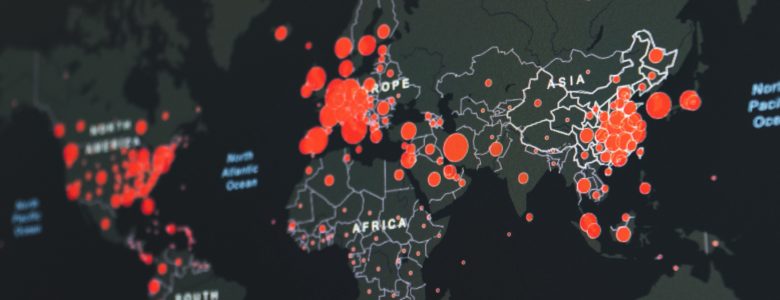
COVID-19 Has Created a Boom Economy for Big Data
COVID-19 may be wreaking havoc on businesses big and small, but there are winners in the pandemic economy. Namely, big data companies. Specifically: Palantir, a company funded by Donald Trump donor Peter Thiel.
Billed as “the world’s leading software for data-driven decisions and operations”, Thiel’s Palantir has gathered an array of government contracts since the coronavirus outbreak. It started with the Center for Disease Control (CDC) contact in late May ($675k). Followed by the Coast Guard in early April ($8.1 million). The two most recent, signed April 11th and 20th with Health and Human Services(HHS), are the biggest at $30 million.
The contracts are split between Palantir’s two entities, Gotham and Foundy, and both have a goal to use data to improve government response to the coronavirus. Palantir Gotham won the HHS contract to provide a “platform” that can import data from various sources. Palantir Foundry won the CDC contract to help “visualize” virus spread and ensure hospital preparedness. Palantir’s contract with the Coast Guard remains undisclosed.
The many contracts between Palantir and the federal government have not gone unnoticed by privacy advocates.
They have long criticized the company’s work with ICE in deportations, spying for the Pentagon, and NSA surveillance. A concern long raised by privacy advocates is Palantir’s growth out of In-Q-Tel, a CIA business investment arm.
Despite privacy criticism, Palantir has secured contracts beyond the US border. Palantir Foundry received a ‘no-bid’ contract with the UK’s National Health Service (NHS) to assist with the coronavirus response. National Health spokesperson Matthew Gould worked to tamp down privacy fears by stating Foundry had been “primarily developed” in the UK. Talks with Germany, France, Austria and Switzerland are also in the works.
Palantir isn’t the only company to benefit from government contracts amidst the pandemic — nor the only one that raises privacy concerns with the work involved.
Cyber-intel firm Cellbrite, long used by law enforcement to track a suspect’s movements, are pitching governments on “contact tracing” software, which would track someone suffering from coronavirus as well as anyone they came in contact with.
Contact tracing isn’t limited to cyber-intel terms like Cellbrite. Apple and Microsoft pitched the Trump administration on a contact tracing app that would create a “timeline” of an infected person’s movements, and send out a warning to anyone who came near the person in recent days or months. Microsoft released its own contact tracing app CovidSafe, which has raised privacy concerns in Australia due to the government contracting Amazon subsidiary, AmazonWebServices, to host collected user data.
Given the need to track COVID-19 to prevent further spread, weighed against the right to personal data, DiEM25’s proposal of a Universal Basic Dividend are more of a necessity than ever. A percentage of reinvested earnings from technology-based initiatives would keep money in the pockets of ordinary citizens, as well as instill a sense of democratic trust between the general public and Silicon Valley — a bridge the latter has been desperate to forge in the wake of the Edward Snowden revelations. Participation in sharing personal data with the app, a current issue with the app-based attempts to fight COVID-19, should be contingent on nothing less.

Starvation in the time of Corona: momentum for the Universal Basic Dividend
The occurrence of COVID-19 has revealed what European States most often try to hide and rely on others to cure: ever increasing poverty in the richest States on the planet.
The quarantine and cessation of economic activities as a result of this pandemic has put “uberised” workers on the frontline, and other kinds of precarious workers at even greater risk.
The COVID-19 crisis also has farther-reaching consequences: for example, the revelation of the scale of the underground economy (whether related to legal or illegal activities) in Europe, which some states prefer to ignore, while others include it in the calculation of their GDP. The increase in unemployment, the reduction in benefits to the unemployed and the increasingly restrictive policies for entering the European Union have led a significant part of the European population to fall back on the underground economy.
By definition, the underground economy consists of undeclared (and therefore also not taxable) economic activities that are difficult to measure. ‘Legal’ underground activities are estimated to account on average for 17% of GDP of, while ‘illegal’ underground activities are estimated to account for at least 3% of GDP. The COVID-19 quarantine and the resulting halt of the free movement of people and goods at both national and cross-border levels has left a significant part of the population without an income.
The first manifestation of this is… hunger!
Beyond a more or less protective social safety net, European states have hypocritically relied upon humanitarian organisations, local associations and even the goodwill of local authorities to take care of those who have been left behind in the event of a hard blow.
But because of the COVID-19 crisis and its economic repercussions, humanitarian organisations and associations, which are already usually overburdened, are currently overwhelmed. These organisations and associations are themselves already suffering the repercussions of certain ultra-liberal policies. For example, one of the first measures taken by the Macron’s government in France, immediately after its election, was to abolish the wealth tax.
In the past, taxpayers who paid this tax could reduce their tax burden by contributing to the budgets of humanitarian organisations. As wealth tax no longer exists, they no longer see any point in doing so, and humanitarian organisations are seeing their budgets significantly reduced. For the first time in its history of 70 years, the Emmaus aid association, for example, is calling for donations.
Schools also used to provide a safety net for vulnerable families that rely on the virtually free school lunch (13 cents per lunch in Paris for the poorest families) to guarantee their children one nutritious meal per day. With schools closed, many families are unable to feed their children, as no meals sold in shops are available at an equivalent price.
In the UK, it is estimated that this could affect 4 million children, i.e. almost 30% of school-age children. The same applies to students throughout Europe who used to eat at university canteens. At the same time, large supermarket chains are taking advantage of the opportunity offered to them by current confinement policies to drastically increase the price of food.
Whether in France, Italy, Spain or elsewhere in the European Union, children are hungry and families can no longer feed themselves. European governments alerted by their respective intelligence services are worried about the repercussions, such as major hunger riots that could explode in southern Italy, in the suburbs of large French or British cities.
These same governments have for decades tolerated the expansion of underground economies by reducing the number of labour inspectors and turning a blind eye to employers not declaring their employees and the trafficking of contraband to avoid social unrest. They have failed to offer lasting solutions such as creating more jobs and legalising immigrants.
Governments now seem to be surprised, or at least worried, about the resulting violence and repercussions of these increasingly ultra-liberal policies of which they were the architects. Worried about hunger riots, some governments are also concerned that criminal organisations may substitute the state in helping citizens and small businesses, and may definitely take roots in large areas of the economy.
Momentum for a Universal Basic Dividend
DiEM25 has, from the outset, advocated not only the end of ultra-liberal policies, but also the introduction of a Universal Basic Dividend (UBD) that would accompany the foreseeable end of the job market as it was traditionally known after the war. It has to be said that although we at DiEM25 have often been labelled as dreamers, now most of our opponents seem to be coming to this exact conclusion.
Japan has just introduced a minimum income for every resident, national or foreigner, to cope with the crisis. Some mayors in California have also tried it and are now pleading to have it implemented nationwide to avoid the worst. Alaska is already offering it statewide. The Democrat candidate Andrew Yang based his platform on this policy.
The UN assistant Secretary General Kanni Wignaraja and the UNDP AP Chief Economist Balazs Horvath are pleading for a universal basic income within the World Economic Forum on 17 April 2020 declaring: “rule number one of crisis management: when you find yourself in a hole, first, stop digging.” They argue that social inequalities end up costing more by way of causing social unrest, mass migrations and the increase of extremist groups capitalising on them. The European Central Bank vice president Luis Guindos mentioned it as well. Even the Pope declared in his Easter letter that it might “be time to consider universal basic wage”.
Two days ago, more than 100 British MPs pleaded for the introduction of a Universal Basic Income (UBI) after 30% of British children have been considered as lacking food; and Spain is taking steps to implement next month a basic income to help citizens weather the economic fallout due to COVID-19. The Spanish minister of economic affairs said “we are going to do it as soon as possible. So it can be useful, not just for this extraordinary situation, and it remains forever.” Other countries in the European Union are thinking about it, and left-wing parties are pushing them to do so. The major counter-argument is the burden put on the taxpayer to finance it.
For the time being, DiEM25 is the only movement offering a solution to the financing argument: we refuse that the universal basic revenue be financed by the taxpayers. That is why we advocate for a Universal Basic Dividend and not simply a Universal Basic Income, i.e. financed in the form of a dividend paid from a portion of shares of listed companies pursuant to stock market transactions or IPOs. We see this dividend as a fair toll payable to the public on stock exchange transactions, particularly from those companies benefiting from state support — shares which would be pooled in a European collective fund that would itself produce a due return.
In the meantime, we would go even a step further in the time of COVID-19: what about ‘helicopter money’ to be created by the ECB: this is totally realistic as it is estimated to 750 billion €, an amount which Lagarde regarded as an amount which can be made available to the banks.
Revolutionary ideas? Not so much — at a historical moment when only creativity and thinking outside of the box will allow European states and their citizens to survive this crisis.
Consider donating to a food bank near you, if you are able to. The image used in this article can be found on Twitter.

DiEM25 TV Presents: Vandana Shiva, Christian Drosten, Grace Blakeley, Kenneth Goldsmith and more!
DiEM25 TV has been bringing you fascinating content during the coronavirus crisis.
We’ve featured such greats as Noam Chomsky, Saskia Sassen, Slavoj Žižek, Astra Taylor, Stefania Maurizi and Gael García Bernal. And you’ve been able to discuss issues like corona-neo-fascism, love, hope and humour in times of coronavirus, as well as the EU’s abject failure to deal with this crisis.
Here’s what DiEM25 TV has in store for you in the upcoming days:
Register to our upcoming programmes and send in your questions to our guest participants in advance or through the live chat on YouTube!
Thursday, May 7, 21:00 CEST
Grace Blakeley, Michael Brooks and David Adler: After Corbyn, after Bernie, what next?
[Register HERE]
Friday Night Special, May 8, 20:00 CEST
Srećko Horvat and special guest Kenneth Goldsmith: “The Virus Mythologies”
[Register HERE]
Monday, May 11, 20:00 CEST
Yanis Varoufakis and Caroline Lucas: “Another Now”
[Register HERE]
Wednesday, May 13, 20:00 CEST
Christian Drosten and Angela Richter: “Virology – total transparency vs fake news”
[Register HERE]
Thursday, May 14, 20:00 CEST
Boris Buden and Maja Pelević: COVID-19 – return of the repressed
[Register HERE]
Friday Night Special, May 15, 20:00 CEST
Srećko Horvat: “The Virus Mythologies”
[Register HERE]
Monday, May 18, 20:00 CEST
Yanis Varoufakis: “Another Now”
[Register HERE]
Tuesday, May 19, 17:00 CEST
Vandana Shiva and Stefania Romano: “Towards a transformation of hope for the earth”
[Register HERE]

Manchester’s quarantined music scene is a microcosm of inequality
Manchester, England, has a vibrant music scene, but the musicians and engineers who work in the industry are almost exclusively self-employed.
The rightful closure of venues, bars, nightclubs and theatres, to prevent the viral transmission of COVID-19 has exposed the hidden reality of insecure work underlying an otherwise highly successful live music industry. It has exposed the stark inequality that self-employed workers face as their employment disappears overnight and they are left with no income.
The city was once the home of cotton spinning mills and the fight for ordinary people to be able to cast their vote in democratic elections — leading to the devastating Peterloo massacre of 1819. Following a rising tide of globalisation and the consequent de-industrialisation of Manchester, music, culture and football are now its main exports to the world. We interviewed the people that work and perform within the city’s music industry in order to shed more light on the pandemics effect on their lives.
Manchester has produced world renowned bands from Joy Division to Oasis and The Stone Roses.
On any night of the week, the live music scene in Manchester is thriving with gigs taking place in venues of various sizes across the city, from local bands just starting out, to international touring artists.
On the 16th of March 2020, Kieran Fairweather, had five gigs booked in for the week, working as a live sound engineer, predominantly in the Manchester area. The reality of this work is that it, fluctuates; no one week is identical to the next, and the workload varies. You may work for fourteen days in a row, or you may only work one or two days in the entire week. Cancellations happen from time to time, people are ill, tickets sales for the event are disappointing, or occasionally bands just do not show up.
By Tuesday the 17th, all of the gigs Kieran had booked in for the week had been cancelled and soon every other mass gathering around the world followed suit. Venues were shut, and festivals were cancelled — devoid of the thronging mass spectacle of joyous, vivid emotion that we have been used to delivering night after night. Under the looming menace of COVID-19, the live music industry put out of work.
Ever since the virus has become rampant worldwide, it has closed venues, bars, nightclubs and restaurants — anywhere that live music flourishes.
The shutdown is essential to protect and save lives from the threat of viral transmission, but since the UK government’s announcement on the 24th of March, of the initial UK wide three-week COVID-19 lockdown, which has been extended until the 7th May, when the lockdown will again be reviewed. There has been a ripple effect throughout the live music industry, which has created devastating misery for all workers in the live music industry and the wider economy.
James Cole, who works as a live sound engineer stated, “We work in live music. If it’s not being played in front of us, there’s not a lot we can do really. We need the venues open, bands playing, and people paying in. Or our skills aren’t a lot of use.”
Musicians and associated engineers create the entertainment that facilitates profit-making for businesses. We are their life force. However, it is businesses that have been protected by the Tory government in the UK — they can apply for immediate grants, business rate reductions and business interruption loans, whereas the self-employed are left to fend for themselves in the wilderness, with only universal credit to fall back on, currently at £94 per week.
Two lighting engineers in Manchester outline their precarious position in the UK. “As creative workers, our work is not deemed as important” Daniel Walker states. “I’ve always felt that my position is very precarious.” He continues, “My previous job as a lighting operator in a venue has ceased. My main source of income just stopped”. Afonso Vaz estimated he would lose about, “£20,000 this business year”.
Paulette Constable, more commonly known as DJ Paulette, is an internationally renowned DJ who has held residencies at some of the most prestigious clubs in the world — including the Hacienda, and the Ministry of Sound. DJ Paulette has recently appeared on Manchester’s initiative, ‘United We Stream’ and streamed a set from her home on Boiler Room.
On the initial impact of COVID-19 on her business she stated: “When it happened, it wasn’t like it was anybody’s fault, or that you were working for an unprofitable business that went bust, all the businesses were doing well. Certainly, in my case I’ve gone from working three nights a week, sometimes four, sometimes five, to not working at all and having absolutely zero pence coming in.” On her current incoming revenue stream, she continues, “It’s gone from hero to zero.”
Musicians, engineers and venue workers need a life line.
The music industry is a vital part of the UK economy. According to the UK government’s annual report on the music industry, Music by Numbers 2019, the music industry contributed £5.2 Billion to the UK economy with £1.1 Billion solely contributed from the live music industry. In 2018, the live music sector employed 30,529 people. From respondents to the Greater Manchester Music Review 2019 of people working in the music industry, only 27.93% were able to make a full time living in the music industry.
We also interviewed a touring sound engineer, who wished to remain anonymous. The engineer stated, “I had a tour planned for most of April and pretty much all of May and that’s been cancelled. It will get rearranged, but it was such short notice cancellation and I’ve lost money.” The cancellations of gigs and other events has decimated musicians and engineer’s income for the foreseeable future, without any clear indication when it will be safe for mass gatherings to resume.
DiEMTV has offered public figures such as academics, policy makers, as well as musicians, a platform through which to discuss current events and their implications on our newly quarantined lives. Musicians are getting involved in politics and using their influence for change as they must find new venues to channel their creativity and agency.
The TV programme, available on YouTube, has notably hosted Roger Waters from Pink Floyd. During the episode, he asked: “will our isolation allow us the opportunity to recognise our predicament a bit more clearly than we did before?”
At the present time, venues are empty shells waiting to be resurrected again by the force of music. Musicians, engineers and audiences are poised to re-animate them again, once it is safe to do so. However, for this to happen, musicians, engineers and venue workers need a life line, and not just the crumbs from the table.
Kieran and Shona Fairweather are in a band, Altered Archipelago: www.musicglue.com/alteredarchipelago their new EP, Push Forward is out now, from which 10% of all sales will go to Partners in Health: www.PIH.org
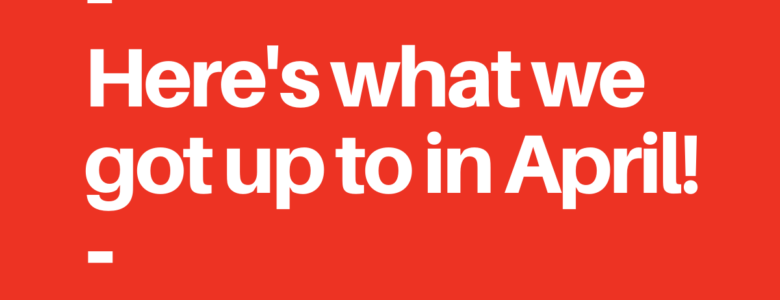
Last month in DiEM25: April 2020
April was the month when we all found out that those running the European Union, and our countries, are prepared to destroy the EU before allowing for the creation of financial solutions that would help the weakest in our society, or shift some power away from the elites.
This is a disastrous resolution, but it is useful for us: it makes certain things clear. Solutions will not come from Brussels. They will not come from our elected governments. Now, more than ever, we need a strong, capable movement to push ahead our common-sense agenda for Europe and its people. Our fellow citizens need it, and it’s the only thing that might save the EU from itself. Here are the steps we took last month to make it happen.
External Actions
- We launched the “Beyond the Balcony: Organising for European Solidarity” series of online discussions, between the pan-European Coordinating Collective of DiEM25 and our national organisers around Europe. Through these calls, we aim to identify the main struggles around Europe where DiEM25 can make a difference, and inspire our members to join those fights!
- We called-out the Eurogroup meeting, where the Finance Ministers of countries with the Euro failed to reach any meaningful agreement to bolster the economy and condemned Europe to yet another catastrophic recession. The criticism can be summarised through this quote by Yanis Varoufakis: “Netherlands and Germany benefit enormously from an exchange rate of the euro which is low because you’ve got deficit countries like Italy, Greece and Spain in them (…) If they want to keep those benefits, they will have to keep Italy in the Euro, and the only way to do that is by mutualizing debt.”
- We also issued a statement predicting the Council of the European Union’s failure to reach a meaningful agreement – not that we’re bragging, it’s not a hard thing to predict. Here’s an extract: “The only thing that truly matters about tonight’s EU Council agreement is that the ruling oligarchy will impose upon Europe’s most vulnerable new national debt that guarantees massive new austerity.”
- We continued building on the immense success of DiEM25 TV (increased our YouTube channel subscribers by 35,000 and received well over 2 million views in the past two months alone), with diverse sessions touching on everything from rock and roll, to activism and the environment, as presented through the thoughts of Roger Waters, Tariq Ali, Stephanie Kelton, David Graeber, Shoshana Zuboff and many others. To view the discussions or to follow our channel, follow this link
- Our Greek political party MeRA25 followed suit by launching MeRA TV. In the first pilot episode they had no one other than the great Academy Award and Palme d’Or winning director Costa-Gavras (article in Greek)
- Our activist also started the grassroots programme “DiEM25 TV goes local!” (and it’s sister programme: focusing on the Green New Deal for Europe) where local political issues are discussed in various languages, bringing DiEM25 closer to the struggles of communities around Europe
- MeRA25 continued its quarantine-adapted actions by organising more local discussions with citizens, organisers and members from various regions of the country. The party also expanded its financial contribution (started in the previous month with the “Day of Solidarity” initiative) to the ever-deepening economic and healthcare crisis in the country by contributing 50% of the income of all MeRA25 MPs for the support of three hospitals in the country.
Internal Actions
- The Coordinating Collective published the Implementation Plan, outlining the next steps towards materialising the vision for DiEM25 2.0 that was presented in the movement’s Assembly in Prague in November 2019. A consultation period on the text of the resulting six All-Member Votes is currently ongoing and will be coming to an end on 6 May
- Following the resignation of two members of the Coordinating Collective members, two new members have replaced them: Rosanna Martens and Fotini Bakadima!
Next Month in DiEM25: May!
Keep an eye out for these exciting initiatives next month:
- The continuation of DiEM25 TV and MeRA25 TV, as well as the “Beyond the Balcony” series
- Our National Collective in France is launching a pan-European Rent Strike! If you want to find out more and get involved, email them at [email protected]
- The votes on the Implementation Plan will go live!
- The IT team published new features for grassroots networking and organising! Watch this video to learn more
- On 1 May we will interview Chris Smalls on DiEM25 TV, who called-out Amazon’s foul practice of forcing employees to work in conditions that expose them to the coronavirus, and was fired for it! Apart from supporting Chris’ inspiring work in the USA, we will follow his example and call for people to come and speak out against bad practices in their companies (Amazon but also any large corporation) in Europe!
- And much, much more!
If you wish to send a point to be included in the next newsletter, or want to help drafting it, please contact us at [email protected]

A European Rent Strike is necessary to prepare the World After Coronavirus
On May 1, the French NC calls for the organisation and support of a European rent strike.
As déconfinement (the uplifting of quarantine) starts, millions of people are left out of a job. We’ve been calling for a solidarity payment to each European citizen. We’ve been calling for months for an emergency housing plan to ensure that everyone has access to a good, sustainable housing.
As the Establishment ignores us, it is time we call a bit louder! The rent strike is aimed at serving the interest of millions of people with precarious access to basic goods, while respecting the preventive policies in place to protect people from the spread of Sars-Cov-2.
Through this action, we are also hoping to start a conversation around our unique emergency 3-Point plan for Europe: if they ask us how to fund our demands, we will talk about Eurobonds, the Universal Basic Dividend, the GNDE. People will say the rules don’t allow it? We can answer that they do, but that we want constitutional assemblies because we are more ambitious for Europe than the rules allow us to be!
After years of seeing our economies and communities enslaved to the interests of the rich and powerful, we want to see finally see them pay their share! The voice of the Left is all but unheard as the crisis expands and millions of people remain in the frontline or are pushed into precariousness. As a result, we can hear once again the now classical narrative of a divided Europe with good and bad nations. History teaches how devastating this narrative is.
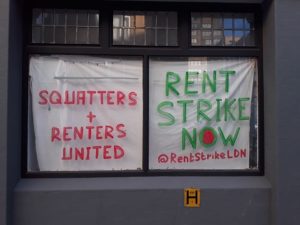
Climate change warns us that pressure on basic goods will only grow stronger with each passing year. It is urgent that we build a counter narrative, a transnational class narrative. It is urgent that we start it, not next month, not next year, but now.
In Germany, massive rent demonstrations were held in several major cities in 2019. In Spain, 200 collectives have already called for such a strike, with first attempts reported in the UK as well as in France this very spring. Students in the UK trapped in university accommodation are withholding their rent, and others are showing their participation in rent strikes by putting white sheets out onto their balconies or windows. Across the United States, the “largest rent strike in nearly a century” is set to take place as organizers help communities around the country to conduct the strike. Communities around the world are participating in a worldwide rent strike, and it’s time for European countries to join.
The coronavirus has made this May Day an even more crucial moment for radical action and solidarity with workers and renters everywhere.
More West Philly #Covid19 art. “Tenants Keep Your Rent. Landlords Keep Your Distance.” #RentStrike pic.twitter.com/mdlBOLvoUF
— Chelsea Chamberlain (@cdchambs) March 26, 2020
This is a historic moment unlike any other any of us has gone through. If we acknowledge the window of possibility such a time opens then it’s our duty to seize the day before the opportunity is lost. It is our duty that we rise to the challenge of our time, and connect these initiatives across the continent, and fulfil the revolutionary mission we chose by joining this movement.
If you want to join this action, or help organise our communities in France for radical change, please email the National Collective of DiEM25 in France at [email protected].